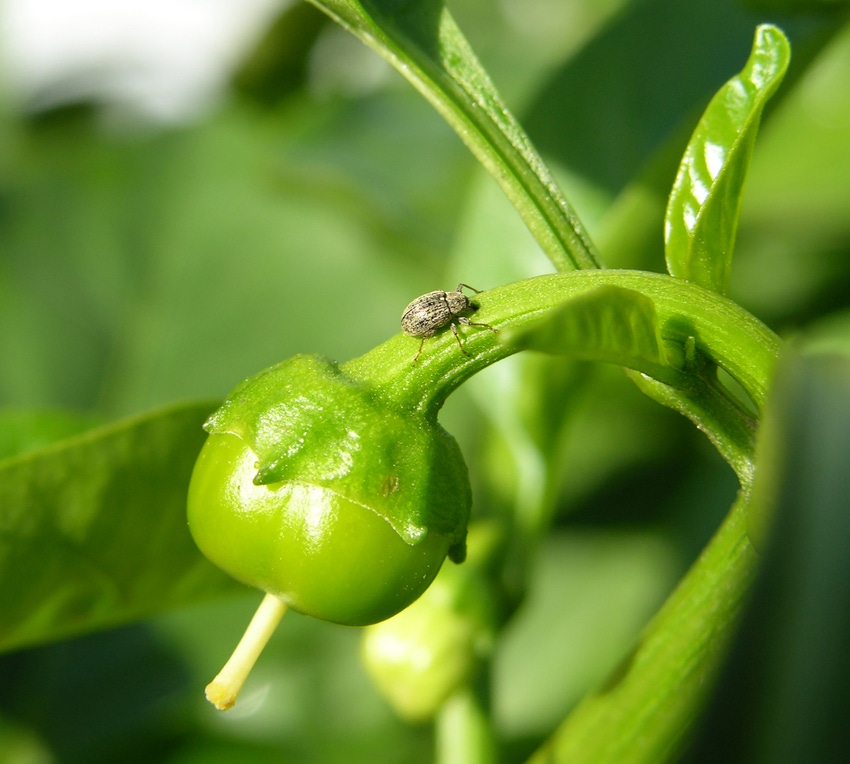
It was suspected but not scientifically confirmed: Were pepper weevils overwintering in Georgia and at what populations?
Dr. Stormy Sparks, University of Georgia Extension entomologist, spoke about the weevil during the morning session at the 2019 Southeast Fruit and Vegetable Growers Conference in January. Sparks and Dr. David Riley, UGA research entomologist, have been looking into the weevil’s winter habits in the southern part of Georgia, where the pest caused considerable problems for pepper growers in 2017.
It is worth remembering that 2016 and 2017 winters in Georgia had few to no days of freezing temperatures, which enflamed some pest problems across much of the farm landscape, most notably major silverleaf whitefly infestations in vegetables and cotton.
In February 2018, Sparks and UGA Extension agents in Echols and Grady counties collected pepper pods in post-harvest fields, with the theory that the-left-behind peppers on the ground might be providing a link in the weevil’s reproductive cycle.
In bell pepper fields, they couldn’t find good pods to collect. Bell peppers rot and fall apart soon after hitting the ground, but in jalapeno fields, they found a lot of jalapeno pods, on top of the ground or even buried a bit, in pretty good shape.
Sparks initially collected the pepper pods to see if the weevils were reproducing in the pods, and weevils were found on the outside of some pods but dissecting the pods back at the lab revealed no adult weevils or grubs inside the pods. Weevils do eat foliage but reproduce only inside pods.
The UGA weevil collection continued for several weeks, and they consistently found adult pepper weevils on pods on the ground, and that’s a problem, Sparks said. The literature says frost, or even temperatures well below freezing, will not kill pepper weevils, But frosty temperatures can affect an adult weevil’s longevity, but that longevity primarily varies according to food availability.
With the February 2018 jalapeno collection study, Sparks shows weevils have a winter food source in the jalapeno fields.
If a weevil doesn’t have a good food source, it can live between one to three weeks. If it has food available, it can live three months or longer. “Jalapeno pods, or standing pepper plants, are likely serving as a food source and are likely allowing over-wintering in southern Georgia,” he said.
They ran the pod collection study in combination with pheromone traps in the same region along field edges in mid-March and consistently caught adult weevils well into April, again confirming a population of weevils over-wintering in south Georgia in 2018.
Sparks and UGA Extension agents in four counties are conducting a similar study again this year in four fields in each county to see what is happening with the population. As of mid-January, pepper weevils were confirmed in some locations.
Sparks’ primary recommendation for growers to manage the pest is to destroy what is left of the pepper crop after harvest, including burying pods if possible.
Pyrethroids, once relied on to control pepper weevil, do not give much control now, he said. Some neonicotinoids show some activity and will do well in a rotation with Vydate, the primary product for pepper weevil control.
Last May, Sparks and Riley urged pepper farmers and workers to watch closely for pepper weevils in fields and on imported peppers and kill immediately any weevils found on fruit, equipment or clothes, explaining at the time that the pepper weevils, once established and reproducing in a field are devastating and difficult to stop, like the boll weevil’s impact once was on cotton.
About the Author(s)
You May Also Like






